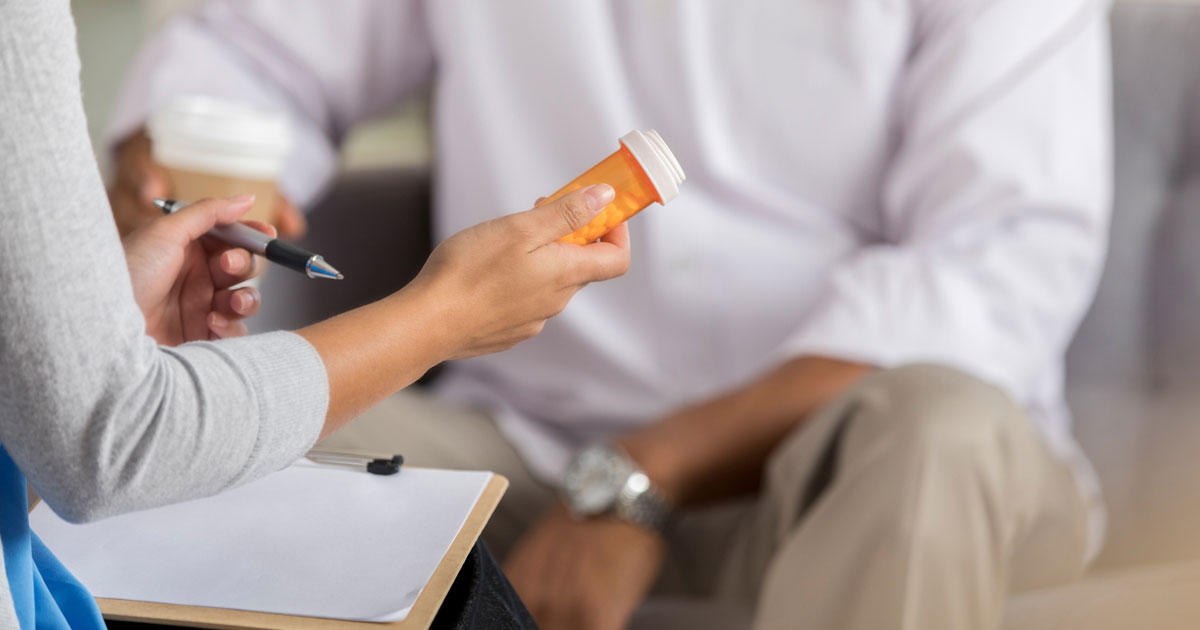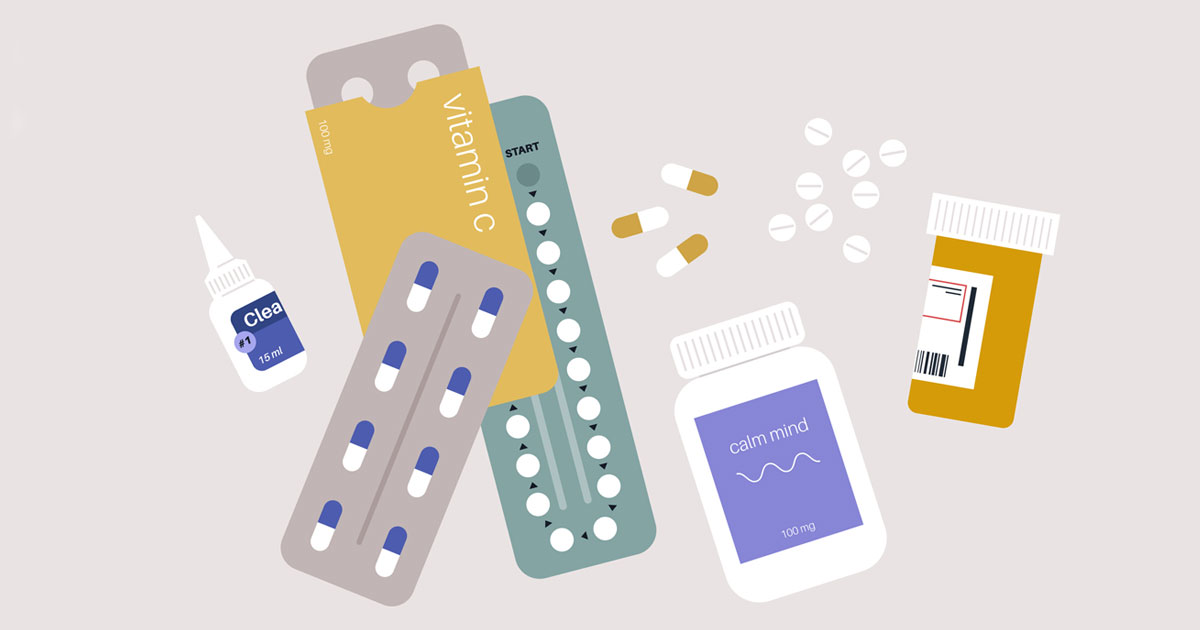Medication-assisted treatment (MAT) is one of the many different services essential for patients in rehabilitation for substance use disorder. Early recovery can be an uncomfortable time and may even be dangerous without access to the proper medications to attenuate the symptoms of withdrawals. In addition, because substance use disorder is often co-occurring with other mental health disorders, there are a variety of different medications that can assist with the various issues a person may face when in recovery.
What Is MAT?
As mentioned, MAT stands for medication-assisted treatment. Medication-assisted treatment is just as it sounds—treatment that makes use of certain medications. More specifically, MAT in a rehabilitation program combines the use of traditional therapy and counseling with professionally administered medications.
MAT is a medical approach to treatment that must be supervised by a physician and a team of substance use disorder treatment professionals. It enables patients to access treatment that helps address their SUD, other issues, co-occurring conditions, and the symptoms of SUD comprehensively. In rehabilitation, medication can be used for a variety of reasons, including during the detoxification process as well as to address other issues that may be contributing to substance use.
Commonly Used Medications for MAT
Within a rehabilitation program, medication-assisted treatment integrates strategies like Cognitive Behavioral Therapy (CBT) along with FDA-approved medications to assist in the recovery process. According to the Substance Abuse and Mental Health Services Administration (SAMHSA), the most used medications in MAT include the following.
Naltrexone
Naltrexone is a non-addictive, FDA-approved medication used to reduce cravings and minimize occurrence of relapse. It can be effective for various substance use disorders, including alcohol use disorder. Naltrexone works by binding to your body’s opioid receptors and blocking the euphoric effects that are caused by consuming alcohol or drugs. This makes the medication extremely helpful for those in the process of eliminating their substance use. Naltrexone is used most often in the earlier stages of recovery.
Buprenorphine
Buprenorphine is one of the first approved prescription medications to help patients combat opioid use disorders (OUDs). It works by helping to reduce a person’s physical dependence on opioids while also decreasing cravings and the effects of withdrawal. Buprenorphine is what is known as an opioid partial agonist, meaning it provides a subtle euphoric effect and slight respiratory depression, similar to an opioid in a very low dose. It helps to reduce the strong cravings for opioids that make them so addictive in the first place, aiding in the recovery process.
Methadone
Methadone is another medication that has been clinically approved to assist with opioid use disorders. It is a full opioid agonist, meaning it binds to your body’s opioid receptors and blocks the feelings opioids can cause. Methadone is typically prescribed to patients once they have begun their process of healing and reached a more stable state, because there is a potential of accidental overdose when not taken properly. When taken as prescribed and under the supervision of a professional, methadone is FDA approved to help combat OUDs and is safe for both short and long-term use. It can reduce feelings of cravings as well as prevent the difficult symptoms that come with opioid withdrawals.
Disulfiram
Disulfiram is used in MAT for those who struggle with alcohol use. It causes unpleasant reactions when alcohol is ingested, including headaches, sweating, nausea, anxiety, and more. This medication is often prescribed after the detoxification process and in the early stages of sobriety, where it works to prevent relapses and chronic drinking. Disulfiram isn’t usually prescribed for long-term periods and is used mostly to help fight the urge to drink. It’s used most commonly under supervision while in a MAT program because medical experts can consistently monitor the patient.
Acamprosate
Acamprosate is another popular medication used in rehabilitation programs that practice MAT. This medication is more commonly used during the process of recovery, in outpatient programs, and for those who are actively trying to not use alcohol. Unlike Naltrexone, Acamprosate cannot be used if a person is still drinking. Instead, it is mostly used to help promote abstinence.
The Benefits of Using MAT in Recovery

Medication-assisted treatment has been shown to provide several benefits when used in rehabilitation programs.
MAT Decreases Chances of Relapse
Recovery is a difficult process that often requires the combination of a variety of methods to help the individual take their life back again. Because medications often work to reduce cravings or block the euphoric feelings provided by the substance of choice, medication-assisted treatment has been shown to help patients avoid relapse. In combination with the tools patients are learning during MAT treatment, such as building healthy coping mechanisms, practicing mindfulness, and building a support network, certain medications can assist with working through cravings and reduce the chances for relapse.
MAT Provides All-Around Help
MAT encompasses the many different aspects of substance use disorder and the person that is struggling with it. Research has found that even if a medication is effective in reducing cravings, it may not work as well when taken alone versus in combination with other forms of treatment. By combining therapy, educational programs, medication, physical care, and support, patients are provided with the all-around help they need to heal.
MAT Reduces Some of the Most Difficult Symptoms of Withdrawal
One aspect of MAT that helps in recovery are some medications’ ability to reduce the symptoms of withdrawal. Recovery is tough, both physically and mentally. Unfortunately, ceasing substance use cold turkey can cause withdrawal, which can trigger symptoms like nausea, sweating, depression, anxiety, hallucinations, and seizures, which may prompt the person to resume substance use. Medications can help to reduce some symptoms of drug and alcohol withdrawal, which can be uncomfortable and even dangerous.
MAT Individualizes Treatment
Medication-assisted treatment is tailored specifically to the person and their unique needs. Every substance use disorder is different, so having a treatment plan unique to the individual is essential when entering recovery. A rehabilitation center will consider the details of your unique circumstances, find a treatment plan, and develop a medication schedule that will help you heal.
MAT Is Effective
MAT is one of the most effective forms of treatment when it comes to substance use disorders. While counseling, therapy, practicing mindfulness, and other strategies are helpful, recovery can be physically grueling and sometimes emotionally overwhelming. When people start to feel the physical stresses of ceasing substance use and begin to feel overwhelmed, chances for relapse increase. Medication-assisted treatment combines a variety of helpful methods along with medication to create an effective treatment format that addresses the whole individual.
How Do You Know If MAT Is Right for You?
MAT is a vital component of many treatment programs, especially those related to a dual diagnosis. How can you tell if it should be an option for you?
You Are Afraid to Take the First Step
Many people who struggle with substance use disorder experience anxiety when it comes to thinking about recovery. The thought of ceasing substance use alone can be intimidating and even off-putting. Fortunately, MAT is a way to make recovery accessible for people that are afraid to take that step into recovery. MAT provides the same counseling support and care as other treatments with the addition of medications that can help you with some of the most difficult parts of the early recovery process.
You Feel Like Recovery Is Too Difficult
Unfortunately, recovering from any kind of substance isn’t easy—but that doesn’t make it impossible. Many people are unaware of the treatment options available at professional recovery facilities and may be less than confident in their ability to power through therapy and begin recovery while they are feeling their worst. However, MAT is one of the best forms of treatment for those who anticipate a difficult recovery, because it can help ease even the most uncomfortable withdrawal symptoms and curb cravings. When you reduce your withdrawal symptoms, combat cravings, and find the focus you need to proceed in your treatment, you’ll feel motivated to recover and believe that you’re able to do it, too.
Your Health Is Suffering
If your mental or physical health are negatively affected by your substance use, this is a sign that it’s time for you to seek rehabilitation for substance use disorder. Long-term substance use can cause a variety of health effects, from slowed cognitive function to heart and lung disease. If your health is suffering due to your substance use, MAT can meet you where you’re currently at and help you begin recovery safely.
Recovery Cove and Medication Assisted Treatment

While everyone’s journey of recovery is unique to their own circumstances, medication is often an essential component of substance use rehabilitation treatment. Here’s everything you might need to know about medication-assisted treatment and how it can help a variety of individuals reach and maintain—recovery.
Sources:
- https://www.samhsa.gov/medication-assisted-treatment/medications-counseling-related-conditions
- https://www.samhsa.gov/medication-assisted-treatment
- https://www.samhsa.gov/medication-assisted-treatment/medications-counseling-related-conditions/naltrexone
- https://www.ncbi.nlm.nih.gov/pmc/articles/PMC2994593/
- https://nida.nih.gov/publications/research-reports/medications-to-treat-opioid-addiction/how-do-medications-to-treat-opioid-addiction-work
- https://www.ncbi.nlm.nih.gov/pmc/articles/PMC3918025/

Clinical Director
Christine Todd is a Licensed Professional Counselor and an Advanced Certified Drug and Alcohol Counselor who enjoys working directly with a population that struggles with addiction and mental health disorders. Christine brings many years of clinical experience to the team at Recovery Cove, where she is currently the Clinical Director. In her role, she oversees the clinical department as a leader, educator and mentor, designing programming and protocols for a diverse client population.




